Stuart Aken's Blog, page 289
September 18, 2011
Stuart's Daily Word Spot: Cable
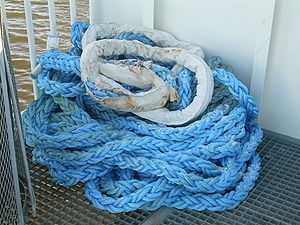 Image via Wikipedia
Image via WikipediaCable: noun - a thick and strong rope made from hemp or wire; in nauticalusage – a strong rope attached to an anchor; a cable length is 200 yards; alength of insulated wire or wires, sheathed in protective casing, used to carryelectric signals and/or electric power; a cablegram; cable TV; system oftransmitting television signals by cable.
'Mick received a cablethat suggested he remove the cable TV he'd illegally installed in his house byfeeding a cable through to his own set from his neighbour's receiver.'
19 September 1911 One ofmy writing heroes, William Golding was born.

Published on September 18, 2011 22:00
September 17, 2011
Stuart's Daily Word Spot: Regrettably or regretfully?
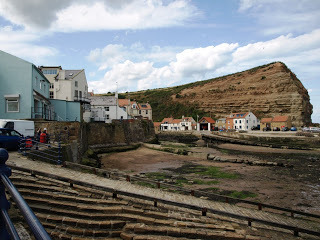 Regrettably or regretfully? Regrettably: adjective - undesirable, unwelcome, deserving censure; something deservingor worthy of regret.
Regrettably or regretfully? Regrettably: adjective - undesirable, unwelcome, deserving censure; something deservingor worthy of regret.Regretfully: adjective - Feeling or showing regret.
Something that is 'regrettable' is somethingundesirable or unfortunate. If, on the other hand, someone is'regretful', they are full of regret and wish they had not done or said whateverinitiated the regret.
So:
'Nancy's overindulgence in alcohol, whichcaused her to perform a spectacular striptease on the top table at her sister'swedding, was regrettable, especially since the groom posted a video of theevent on Youtube.'
'Nancy was regretful that she'd allowed toomuch alcohol to influence her into performing a humiliating strip before allthe guests at her sister's wedding, especially when the groom, who she wastrying to impress, exposed her to the world by posting a video online.'
Pic: The sea front at Staithes, North Yorkshire.

Published on September 17, 2011 22:00
Reading A Writer's Mind: Exploring Short Fiction – First Thought to Finished Story
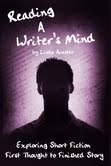 Reading A Writer'sMind: Exploring Short Fiction – First Thought to Finished StoryLaunch Offer: 99c /86p
Reading A Writer'sMind: Exploring Short Fiction – First Thought to Finished StoryLaunch Offer: 99c /86pS.A. Linda Acaster isa writer whose name long-standing readers of this blog will recognise for thediverse range of her fiction. But she has another life…
L.A. Ho-ho… I have several actually, but this one began manyyears ago when I was better known for my short fiction. A creative writingtutor at a local Adult Education establishment asked if I'd mind stepping in whileshe visited her sister in Australia.The gig was two hours a week for five weeks.
Those five weeks turned into three years, and along the way Ifound I laid bare the mechanics of my own creative process. A stint with a distancelearning college tutoring creative writing courses honed my explanatory skillson the page, and a host of how-to articles on the techniques of writing fictionfollowed in the writing press both in the UK and the USA. It is thisexperience that has been distilled into ReadingA Writer's Mind: Exploring Short Fiction – First Thought to Finished Story.
I've never been a writer who wrote in one style, in onegenre, using one method of delivery, and this became key to the format of thebook. Taking ten stories, I lead the reader from the initial idea trigger, throughthe story itself, to an in-depth commentary covering the options considered andthe decisions made during the writing. The stories were chosen to highlightparticular techniques within a specific genre, for instance:
* Lyrical narrative v terse dialogue; using tone as adescriptive tool (Mainstream) * A calendar structure using the Tell technique (Women'sFiction)* Working with parallel storylines via past and presenttense (SF)
There are suggestions for experimenting with each set oftechniques discussed, and the book wraps up with a section on common editingconcerns. Like this blogpost, I use an accessible, chatty style and pull nopunches about rewrites and the problems I faced. I aim for my experience tofeed into your fiction.
Other books focusing on aspects of writing fiction are inthe pipeline, each under the banner ReadingA Writer's Mind.
For the rest of September Reading A Writer's Mind: Exploring Short Fiction – First Thought toFinished Story is on a launch offer:
Kindle UK –86pKindle US –99cSmashwordsfor I-Pad, Nook, Sony, Kindle, etc, use the 66% discount code BN46H at checkout.
For more information on all Linda Acaster's work:blog: http://lindaacaster.blogspot.comwebsite: http://www.lindaacaster.comhttp://twitter.com/#!/lindaacaster
For my review of this excellent volume see http://stuartaken.blogspot.com/2011/09/review-of-reading-writers-mind.html It's just a short scroll down this page!

Published on September 17, 2011 00:00
September 16, 2011
Stuart's Daily Word Spot: Backbite
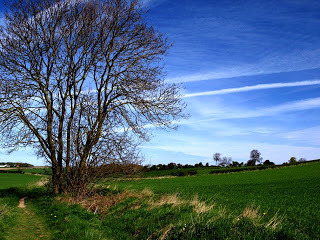 Backbite: verb - speak ill of someone or slanderthem behind their back.
Backbite: verb - speak ill of someone or slanderthem behind their back. 'Janice was full ofgossip; not the everyday sort that does no harm: instead, she would backbiteabout all and sundry, never caring what damage her lies and slanders might doto the reputations of people who were supposed to be friends.'
17 Sep 2011 - Great NorthRun takes place up in the north east of England. Great charity event inspiring effort from folk who often wouldn't normally run.
Pic: A Spring landscape just a few minutes from my front door.

Published on September 16, 2011 22:30
Review of 'Reading A Writer's Mind: Exploring Short Fiction – First Thought to Finished Story' by Linda Acaster.
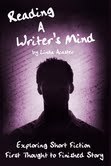 Writing manuals come in many guises. Linda Acaster's 'ReadingA Writer's Mind: Exploring Short Fiction – First Thought to Finished Story', ifyou'll forgive the reference, does what it says on the tin. If you're a reader, you'll find this book worthwhile andentertaining simply for the stories it presents for examination by writers. Thefiction is varied in genre and style but consistent in its good quality. Eventhe stories specifically written for the 'women's fiction market' are wellstructured and populated by rounded characters who will be familiar to mostreaders.If you're a writer, this is a book that will help developyour short fiction. The sample stories illustrate the author's points perfectlyas she explains her reasons for the various selections a writer must make as apiece of short fiction is constructed. Here you'll find advice on character formingand building, plot structure, language choice, viewpoint selection and muchmore. Linda introduces each story, and then presents it for reading in full.She follows this with an explanation of the processes she used in theconstruction. Finally, she sets thereader an exercise in order to consolidate and fully bed in the lesson of thesection. Most writers are resistant to exercises: I certainly am.However, as with the excellent suggestions made by Dorothea Brande in her'Becoming a Writer', Linda's practice pieces are designed to make the reader abetter writer and will pay dividends to those who attempt them.I'm not a lover of writing manuals, but I place this onealongside the excellent Dorothea Brande's book, already mentioned, and StephenKing's 'On Writing', both of which have been formative in my writing. Linda Acaster's concise but comprehensive work onapproaching short fiction now has a permanent place in my library and I shallreturn to it each time I begin a new short story, in the hope that I canimprove on my skills and reach the market I am aiming at.
Writing manuals come in many guises. Linda Acaster's 'ReadingA Writer's Mind: Exploring Short Fiction – First Thought to Finished Story', ifyou'll forgive the reference, does what it says on the tin. If you're a reader, you'll find this book worthwhile andentertaining simply for the stories it presents for examination by writers. Thefiction is varied in genre and style but consistent in its good quality. Eventhe stories specifically written for the 'women's fiction market' are wellstructured and populated by rounded characters who will be familiar to mostreaders.If you're a writer, this is a book that will help developyour short fiction. The sample stories illustrate the author's points perfectlyas she explains her reasons for the various selections a writer must make as apiece of short fiction is constructed. Here you'll find advice on character formingand building, plot structure, language choice, viewpoint selection and muchmore. Linda introduces each story, and then presents it for reading in full.She follows this with an explanation of the processes she used in theconstruction. Finally, she sets thereader an exercise in order to consolidate and fully bed in the lesson of thesection. Most writers are resistant to exercises: I certainly am.However, as with the excellent suggestions made by Dorothea Brande in her'Becoming a Writer', Linda's practice pieces are designed to make the reader abetter writer and will pay dividends to those who attempt them.I'm not a lover of writing manuals, but I place this onealongside the excellent Dorothea Brande's book, already mentioned, and StephenKing's 'On Writing', both of which have been formative in my writing. Linda Acaster's concise but comprehensive work onapproaching short fiction now has a permanent place in my library and I shallreturn to it each time I begin a new short story, in the hope that I canimprove on my skills and reach the market I am aiming at.
Published on September 16, 2011 11:55
Stuart's Daily Word Spot: Abduct
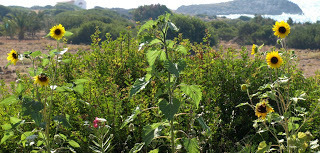 Abduct: verb - lead away or take a person byillegal force;
Abduct: verb - lead away or take a person byillegal force; 'Many of the world's moreextreme groups, along with the most selfish and grasping of criminals, abductindividuals as a means of either gaining funds or promoting their indefensiblecauses.'
Pic: Sunflowers near Sissi, Crete: brightness to illuminate a dark definition.
Published on September 16, 2011 06:00
September 14, 2011
Author, William Horwood, Interviewed.
 Hello William, please tell us about you, as a writer.
Hello William, please tell us about you, as a writer.67 years old, 5'11", 18 novels published since 1980
Your latest book AWAKENING is an adult fantasynovel. Perhaps you'd you give us some insightinto it in a few sentences?
Awakening, adult fantasy fiction. This is the second in aquartet of books about the Hyddenworld, a parallel universe of little peopleThe overall story arc is how some hydden and human heroes combine to save theuniverse from destruction caused by human abuse of the Earth. (SA – This was published by PanMacmillan on 5thAugust 2011)
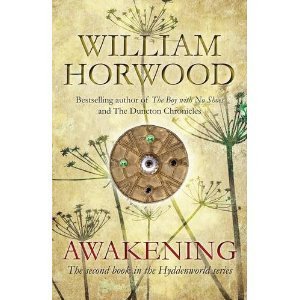 How did you come towrite this particular book?
How did you come towrite this particular book?I had the idea a decade ago while driving along a motorway andimagining that little people (hydden) lived on the verges. I sold it toPanMacmillan.
Do you have a favouritecharacter from the book? If so, who and why this particular one?
Yes, Bedwyn Stort, a scholarly hydden. He's a true hero, meaninghe doesn't know he is.
Where can people buyyour books?
In book-stores or as an e-book. (SA, see William'sauthor page on Amazon UK – orin USA )
What qualities does awriter need to be successful?
Persistence, a reading habit, abilty to work alone.
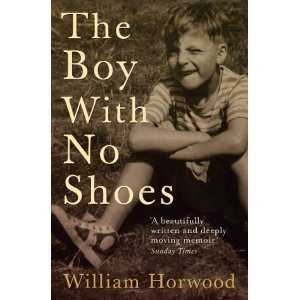 What's your workingmethod?
What's your workingmethod?2000 words a day, then revise previous words. I rarely achieveit, but that target means that the books get written.
What's the singlebiggest mistake made by beginner writers?
Two connected ones: crazy belief that what they're doing isREALLY important and an inability to ruthlessly self edit. The quickest cure isto read what you've written aloud into a tape recorder, and listen to it. Trustme, you'll soon hear the errors of your ways and appreciate you are notShakespeare or Chekhov.
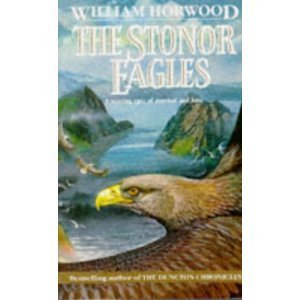 To what extent aregrammar and spelling important in writing?
To what extent aregrammar and spelling important in writing?Important. Especially now books are so badly copy-edited bypublishers.
How much do you reviseyour MS before sending it off?
Hugely.
As awriter of fantasy fiction to what extent do you think genre is useful in thepublishing world?
The only thing useful in the publishing world is what givesreaders pleasure and sells well enough to be worth repeating.
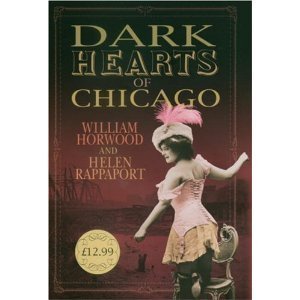 Manyauthors see marketing as a bind. What's your opinion on this, and how do youdeal with it?
Manyauthors see marketing as a bind. What's your opinion on this, and how do youdeal with it?Marketing is vital. Study it. Even more so now that selfmarketing is possible via the internet. We are less in the hands of thepublishers than we were so it's gotten easier.
What sort ofdisplacement activities keep you from writing?
Everything you can think of and more. When, during the writingday, I get a sudden conviction that I MUST do something other than writing, Iknow it's displacement. Too often I do it anyway.
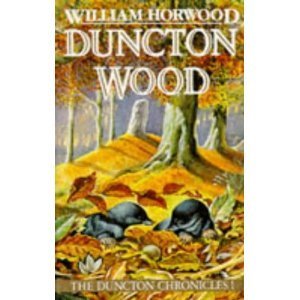 Whatsupport, if any, do you receive from family and friends, writing group, ordedicated professionals?
Whatsupport, if any, do you receive from family and friends, writing group, ordedicated professionals?A lot from a very, very few. The rest simply do not understand.
Is presentation of theMS as important as agents and publishers suggest?
Yes.
How long does it takeyou to write a novel?
About 14 months. Quickest was 31 days; longest 4 years.
Who or what inspiresyour writing?
 Many other novelists, films and a desire to share my vision withothers.
Many other novelists, films and a desire to share my vision withothers.If there's a singleaspect of writing you find frustrating, what is it?
Wish I could work faster.
Is there a particularfeature of writing that you really enjoy?
Field research and writing the last chapters of a book.
Do you believe creativewriting is a natural gift or an acquired skill?
Both. People with no talent get published and make money; peoplewith loads often never do.
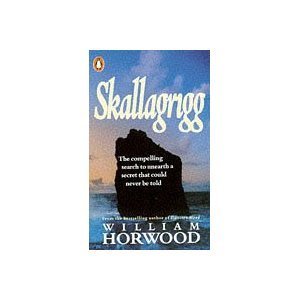 What are you writingnow?
What are you writingnow?The third novel in the Hyddenworld Quartet.
Do you have a website orblog where readers can visit?
http://www.williamhorwood.co.uk/index.php
Given unlimitedresources, where would you do your writing?
In an airy, summery room with instant access to a hamam,swimming pool, boule ground, my partner, a great kitchen, wonderfulingredients, a top restaurant, and a deserted beach.
Where do you actuallywrite?
In my living room.
Published on September 14, 2011 23:00
Stuart's Daily Word Spot: Purposely or purposefully?
Purposely or purposefully?
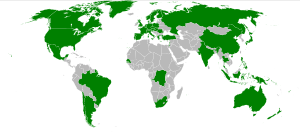 Image via WikipediaPurposely:adverb - on purpose or by design; donewith intention, deliberately.
Image via WikipediaPurposely:adverb - on purpose or by design; donewith intention, deliberately.Purposefully:adverb - having a purpose or meaning;designed or intentional; with a definite purpose in mind; resolute.
Whatyou do 'purposely', you do deliberately.Whatyou do 'purposefully', you do resolutely and with some purpose in mind.
So:
'Jasonplaced the bar of wet soap purposely to see Jane step on it, slip and land inthe bath full of cold water.'
'Janepurposefully surveyed the floor before entering the bathroom, knowing Jason waslikely to try to play some dirty trick on her.'
15 September 1971Greenpeace was founded. I joined them later in the same decade, about 1976, ifI remember rightly.

Published on September 14, 2011 22:00
September 13, 2011
Stuart's Daily Word Spot: Zealot
 Zealot: noun – originally, a member of a Jewishsect in Palestine, whose passionate opposition to foreign rule led to theJewish uprising against Rome, ad 66–70; someone who is zealous for a cause;someone carried away by excess of zeal; a fanatic.
Zealot: noun – originally, a member of a Jewishsect in Palestine, whose passionate opposition to foreign rule led to theJewish uprising against Rome, ad 66–70; someone who is zealous for a cause;someone carried away by excess of zeal; a fanatic.'Most of those criminal idiotswho strap explosives to their bodies and kill innocents indiscriminately,consider themselves zealots, but any reasonable person knows they aresociopaths without a shred of respect for any life.'
Pic: A bright subject to counter the depressing one conjured by today's word.

Published on September 13, 2011 22:00
September 12, 2011
Stuart's Daily Word Spot: Practise or Practice?
 Image via Wikipedia
Image via WikipediaPractise or Practice?Practise: verb - perform or carry out constantly or habitually; act upon insteadof simply professing a belief;exercise or pursue a profession oroccupation, such as law or medicine; observe, actively follow the doctrines of areligion; actually carry out a law or command; do something repeatedly toacquire a skill; train or drill someone; make practical use of, employ; try todo something; Design a means to bring about, plan; plot an evil or unlawful act;try out or use experimentally.
Practice: noun - doing something; the usual or customary action orperformance; a custom; a habit; in Law - established method of legal procedure;exercise of a profession or occupation; the business to which a lawyer or doctorbelongs; repeated performance of an action to gain or keep proficiency in it;activity undertaken to this end; practical application as opposed to the theory;exercise; a practical treatise.
We all know that 'practise' is theverb and 'practice' the noun, but this is not easy to remember for many.However, if you think aboutsimilar words this might help.Advise is similar to 'practise'and has the advantage that you know that 'to advise' is a verb.Similarly, advice is similar to'practice', and we all know that 'advice' is a noun.
'Unless you practise more, Miss Bennett, you'llnever be proficient.' Pride andPrejudice.
'Kim had been a doctor for severalyears and had her own practice on the high street.'

Published on September 12, 2011 22:00



